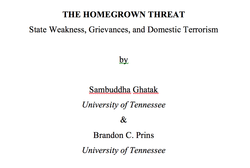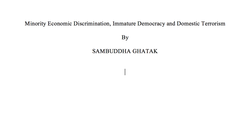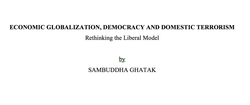
The first paper from this research project examines the demand and opportunity for domestic terrorism in all countries worldwide. We explore the empirical relationship between state strength, group grievance, and the incidence of domestic annual terrorism. Our results convincingly show state strength to drive terrorism lower and repression to drive it higher. We also observe domestic terrorism to correlate spatially.
*Click the title page to download the draft manuscript*
*Click the title page to download the draft manuscript*

Domestic terrorism, as a form of intrastate violence, has varied widely in South Asia along with the post-Cold War period of global economic integration and political openness. How are these two phenomena– economic integration and emergence of democracies – related to domestic terrorism in South Asia? I argue that resorting to terrorism is a rational choice when individuals/groups‘ cost of heterogeneity -- deprivation from public goods due to geographical and ideological distance -- increases; opportunity is provided by democratization and integration to the global economy. The testable hypotheses derived from the theory are empirically tested on a dataset of five South Asian countries for the time period between 1990 and 2007. The results show that both minority discrimination and presence of unconsolidated democratic institutions increase terrorism in the highly heterogeneous South Asian countries. International trade in the presence of minority discrimination increases homegrown terrorism, but foreign direct investment neither increases nor decreases such incidents. This manuscript is forthcoming in Terrorism and Political Violence.
*Click the title page to download the draft manuscript*
*Click the title page to download the draft manuscript*

Few studies explore how grievances and opportunities interact to produce higher levels of domestic terrorism, leading to a ‘discovery lag’ in terrorism research. This study -- relating political openness to one of the well observed predictors of domestic terrorism – minority economic discrimination -- attempts to fill gaps in the literature. I argue that terrorism is rational choice when minorities’ deprivation from public good increases and political openness provides aggrieved sections of such minorities to mobilize. Using data from the Minorities at Risk project, I find that immature or unconsolidated democracy in itself and in the presence of minority economic discrimination increases the likelihood of such attacks. This manuscript is currently under review.

The effect of economic globalization and democracy on the number of domestic terrorist incidents within countries is analyzed statistically, using a sample of 172 countries from 1990 to 2007. Results show that economic globalization and democracy increase domestic terrorism. Trade has no direct positive effect on domestic terrorist incidents, but economic development of a country increases the number of terrorist incidents inside the country. The unsettling forces of economic globalization and permissive nature of a democracy are argued to be responsible to higher levels of domestic terrorism in a country. This manuscript is currently under review.
